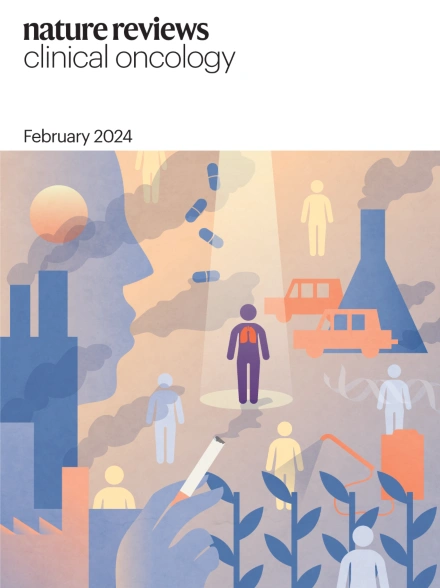晚期 HER2 阳性乳腺癌患者的管理:现有证据与未来展望
IF 81.1
1区 医学
Q1 ONCOLOGY
引用次数: 0
摘要
在15%-20%的浸润性乳腺癌中可发现编码HER2的基因ERBB2的扩增和/或过表达,这与侵袭性表型和不良临床预后有关。在分子生物学和药物开发方面的不懈研究已促成了多种 HER2 靶向疗法的应用,包括单克隆抗体、酪氨酸激酶抑制剂和抗体-药物共轭物,成为肿瘤学从实验室到临床转化的最佳范例之一。每一类药物都改善了患者的预后,更重要的是,不同 HER2 靶向疗法的组合和连续使用提高了早期疾病的治愈率,并大大延长了晚期疾病患者的生存期。在本综述中,我们将介绍现代治疗 HER2 阳性晚期乳腺癌范式发展的关键步骤,包括新一代 HER2 靶向疗法的选择和排序,并总结关键性研究的疗效和安全性结果。然后,我们概述了目前已知的与 HER2 靶向疗法耐药性有关的因素,如 HER2 瘤内异质性、替代信号通路的激活和免疫逃逸机制,以及未来可能用于克服这种耐药性并进一步改善患者预后的潜在策略。本文章由计算机程序翻译,如有差异,请以英文原文为准。


Management of patients with advanced-stage HER2-positive breast cancer: current evidence and future perspectives
Amplification and/or overexpression of ERBB2, the gene encoding HER2, can be found in 15–20% of invasive breast cancers and is associated with an aggressive phenotype and poor clinical outcomes. Relentless research efforts in molecular biology and drug development have led to the implementation of several HER2-targeted therapies, including monoclonal antibodies, tyrosine-kinase inhibitors and antibody–drug conjugates, constituting one of the best examples of bench-to-bedside translation in oncology. Each individual drug class has improved patient outcomes and, importantly, the combinatorial and sequential use of different HER2-targeted therapies has increased cure rates in the early stage disease setting and substantially prolonged survival for patients with advanced-stage disease. In this Review, we describe key steps in the development of the modern paradigm for the treatment of HER2-positive advanced-stage breast cancer, including selecting and sequencing new-generation HER2-targeted therapies, and summarize efficacy and safety outcomes from pivotal studies. We then outline the factors that are currently known to be related to resistance to HER2-targeted therapies, such as HER2 intratumoural heterogeneity, activation of alternative signalling pathways and immune escape mechanisms, as well as potential strategies that might be used in the future to overcome this resistance and further improve patient outcomes. The discovery of ERBB2 as a gene frequently amplified and/or overexpressed in breast cancers and of its product HER2 as a biomarker has spurred the development of various targeted therapies. As a result, the prognosis of patients with advanced-stage HER2-positive breast cancer has greatly improved in the past decades. The authors of this Review describe the development of the current treatment landscape for these patients and discuss how to address resistance to further improve outcomes.
求助全文
通过发布文献求助,成功后即可免费获取论文全文。
去求助
来源期刊
CiteScore
99.40
自引率
0.40%
发文量
114
审稿时长
6-12 weeks
期刊介绍:
Nature Reviews publishes clinical content authored by internationally renowned clinical academics and researchers, catering to readers in the medical sciences at postgraduate levels and beyond. Although targeted at practicing doctors, researchers, and academics within specific specialties, the aim is to ensure accessibility for readers across various medical disciplines. The journal features in-depth Reviews offering authoritative and current information, contextualizing topics within the history and development of a field. Perspectives, News & Views articles, and the Research Highlights section provide topical discussions, opinions, and filtered primary research from diverse medical journals.

 求助内容:
求助内容: 应助结果提醒方式:
应助结果提醒方式:


